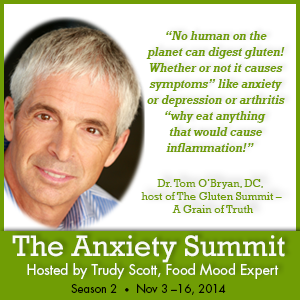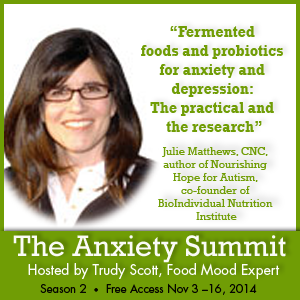Dr. Tom O’Bryan, DC host of ‘The Gluten Summit – A Grain of Truth’ is interviewed by host of the Anxiety Summit, Trudy Scott, Food Mood Expert and Nutritionist, author of The Antianxiety Food Solution.
Gluten’s impact on the inflamed brain: reducing anxiety and depression
- Terminology and why it’s not called gluten intolerance but sensitivity
- Is gluten sensitivity just a fad and the recent FODMAPs research
- The multitude of diseases and symptoms caused by gluten sensitivity
- Gluten sensitivity as a contributing factor to psychiatric manifestations/anxiety/depression and new 2014 research from Italy
- Suicide rates in kids with celiac disease (even when they quit gluten), and kids celiac camps
- The conundrum with testing
- Doing an elimination and then challenge?
- Can anyone eat wheat or should we all be gluten-free
One of my favorite quotes in my anxiety food talks is this one from a 2012 paper by Jackson and Fasano called Neurologic and psychiatric manifestations of celiac disease and gluten sensitivity
gluten sensitivity remains undertreated and underrecognized as a contributing factor to psychiatric and neurologic manifestations.
Here are some snippets from our interview:
73% of kids with celiac disease have social phobia, 63% still have social phobia on a gluten-free diet. You have to also heal the gut and address nutritional deficiencies
No human on the planet can digest gluten! Whether or not it causes symptoms like anxiety or depression or arthritis why eat anything that would cause inflammation!
He shares recent research published in BMC Medicine. The study looking at Italians with non-celiac gluten sensitivity, found that 68% of participants felt “a lack of well-being” and 39% experienced anxiety. In the large majority of patients, the time lapse between gluten ingestion and the appearance of symptoms varied from a few hours to 1 day.
No human on the planet can digest gluten! Whether or not it causes symptoms” like anxiety or depression or arthritis “why eat anything that would cause inflammation”
The gluten-FODMAPs discussion and non-celiac gluten sensitivity is a fad:
- No effects of gluten in patients with self-reported non-celiac gluten sensitivity after dietary reduction of fermentable, poorly absorbed, short-chain carbohydrates.
- The article in Forbes : Gluten Intolerance May Not Exist
- Randomised clinical trial: gluten may cause depression in subjects with non-coeliac gluten sensitivity – an exploratory clinical study.
Dr. O’Bryan summed it up like this:
it took two studies to do this but it appears to be the FODMAPs in the wheat that cause the GI complaints (the bloating, the gas, the abdominal pain) but it’s the proteins that cause symptoms in the brain and other parts of the body
I write about gluten often. Here are some additional links for you:
- I was interviewed on Gaiam TV and discussed the gluten-mood connection
- I presented a poster called Gluten and the serious effects on mental health at the 2013 annual conference of the Anxiety and Depression Association of America/ADAA
- and here part 1 of a 2 part blog on gluten and mood
Last year Dr. O’Bryan hosted the fantastic Gluten Summit and you can grab a copy of one of the interviews here: Dr. Marsh’s Gluten Summit interview: Why the Early Stages of Celiac Disease Must be Taken Seriously
If you are not already registered for the Anxiety Summit you can get live access to the speakers of the day here www.theAnxietySummit.com








